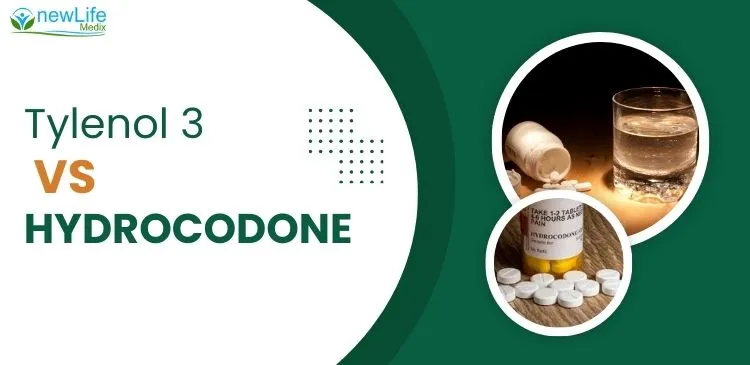Nowadays, a lot of people are prone to various pains, in the US. These all pains might be either mild or severe, often depending upon the types and causes of pain.
Generally, individuals do not consider pain, on a much serious note. In other words, we can say, that people do not care too much about pain, they are suffering from, only if its a mild pain.
While, most people do not see pain as a hindrance in their day to day work, still, there are some people that suffer from certain types of pain.
In this blog, we will compare Tylenol 3 and Hydrocodone drugs, and their functions, uses, doses, strengths, and side effects and precautions to be taken before using pain reducing medications.
Difference Between Tylenol 3 and Hydrocodone Drugs
Overview
What is Tylenol 3?
Tylenol 3 is a narcotic analgesic, which acts on the central nervous system in order to provide relief from mild to moderate levels of pain in patients. Moreover, the Tylenol 3 is also helpful to reduce fever.
What is Hydrocodone?
Hydrocodone is a type of an opioid, generally having a semi-synthetic nature. The Hydrocodone is useful for providing relief from moderate to severe types of pain.
Function of Drug
Tylenol 3
- Tylenol 3 falls under the category of medications like antipyretics (fever reducers) and analgesics (pain relievers).
- Tylenol 3 works by cooling the body and altering the sensory perception of the body towards pain.
- Tylenol 3 belongs to the medication class called antitussives and the class of medication called opiate analgesics.
Hydrocodone
Hydrocodone is used to relieve persistent pain among the ones who are in the dire need of opioid pain medication only, and cannot be treated by the other pain medications.
The ER tablets of Hydrocodone, are not meant for treating such pain which is liable to be controlled by any type of medication.
It often works by altering the responding type of the nervous system and the brain, in cases of pain signals.
Uses
Tylenol 3
Tylenol 3 may be used as follows:
- The Tylenol 3 medicine often comes as a capsule, liquid, and tablet, to be taken orally from the mouth.
- Tylenol 3 is generally taken at the time intervals of about every 4 hours.
- One must follow the prescribed dosages, in a precise manner, as failing to do so, might cause some minor or even major ill effects.
- Also, it is advisable, not to stop the medication, once any patient has been taking it for several weeks, without any prior consultation to the doctor.
Hydrocodone
Hydrocodone may be used as follows:
- Take it by mouth or orally, accompanied by a glass of water.
- The patient must follow the directions, which have been mentioned on the prescription label of the Hydrocodone medicine.
- The Hydrocodone medicine can either be taken without food, as in, on an empty stomach, or, with food, also.
- Moreover, if taking the hydrocodone medicine, causes any stomach-related problem, then the patient should take it with a meal.
Dose and Dosage Strength
Tylenol 3.
The Tylenol 3 is available in tablet form and liquid form as well.
The dosage of the Tylenol 3 is as follows.
Oral (Solution)
- Children: As prescribed by the doctor.
- Adults: Fifteen ml, for every 4 hours.
Oral (Suspension)
- Children (Younger than 3 years of age): As prescribed by the doctor.
- Children (3 years to 6 years of age): Five ml; Three or Four times per day.
- Children (7 years to 12 years of age): Ten ml; Three or Four times per day.
- Adult (Above 12 years of age): Fifteen ml; Every four hours as needed.
Hydrocodone
The Hydrocodone comes in the form of capsule as well as oral tablet.
The dosage of the Hydrocodone is as follows.
- ER Tablet: 120 mg, 100 mg, 80 mg, 60 mg, 40 mg, 30 mg, and 20 mg.
- ER Capsule: 50 mg, 40 mg, 30 mg, 20 mg, 15 mg, and 10 mg.
Side Effects
Tylenol 3
A few side effects of the Tylenol 3 have been mentioned below.
- Problem while breathing or swallowing food.
- Body parts such as the lips, feet, hands, lower legs, throat, eyes, ankles, face or tongue start to swell.
- Red and peeling skin.
- Itching Hives, or rashes.
- Loss of coordination, Shivering, confusion, diarrhea, or nausea.
Hydrocodone
Below is a mention of some side effects of Hydrocodone.
- Liver Injury – Nausea, fatigue, appetite loss, pain in the right upper portion of belly.
- Allergy – Hives, swollen lips, swollen face, or swollen tongue, skin rash, itching.
- Low Adrenal Gland Function – Vomiting, appetite loss, dizziness, nausea, fatigue.
- Depression of the CNS – Shortness of breath, having trouble in staying awake, confusion, dizziness, feeling faint.
Precautions
- The Hydrocodone may cause dizziness, to avoid which the patient should get out of the bed, bit slowly.
- Also, one must rest the feet on the floor for a few minutes, before standing on the ground.
- In case of any surgery, patients must inform the doctor about their taking the dosages of the Hydrocodone.
- Also, since this medicine might make patients drowsy, one should refrain from operating any machinery as well as driving vehicles.
- It is also that this medication is also responsible for decreasing the fertility rate in both the genders, so, in order to avoid any future problems, consult the doctor regarding the risks of taking this medicine.

